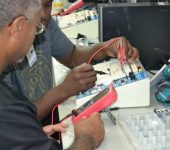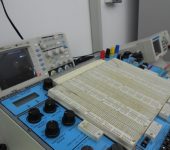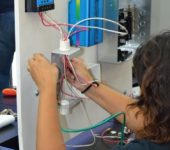Course Brief
Unit Abstract
Electrical engineering is mainly concerned with the movement of energy and power in electrical form, and its generation and consumption. Electronics is mainly concerned with the manipulation of information, which may be acquired, stored, processed or transmitted in electrical form. Both depend on the same set of physical principles, though their applications differ widely. A study of electrical or
electronic engineering depends very much on these underlying principles; these form the foundation for any qualification in the field, and are the basis of this unit.
The physical principles themselves build initially from our understanding of the atom, the concept of electrical charge, electric fields, and the behaviour of the electron in different types of material. This understanding is readily applied to electric circuits of different types, and the basic circuit laws and electrical components emerge. Another set of principles is built around semiconductor devices, which become the basis of modern electronics. An introduction to semiconductor theory leads to a survey of the key electronic components, primarily different types of diodes and transistors.Electronics is very broadly divided into analogue and digital applications.
The final section of the unit introduces the fundamentals of these, using simple applications. Thus, under analogue electronics, the amplifier and its characteristics are introduced. Under digital electronics, voltages are applied as logic values, and simple circuits made from logic gates are considered.
On successful completion of this unit students will have a good and wide-ranging grasp of the underlying principles of electrical and electronic circuits and devices, and will be able to proceed with confidence to further study.
- This course is offered in 45 hours.
-
BTEC Higher National Diploma (HND) in Engineering (Electrical and Electronic Engineering)
The Pearson BTEC Higher National Diploma (HND) in Engineering (Electrical and Electronic Engineering) will develop students into highly trained, competent professionals, who are able to meet the demands of employers in the various engineering sectors.
This qualification also serves as the next step for students completing the SBCS Diploma in Electrical and Mechanical Engineering Technology programme and are interested in pursuing the BEng (Hons) in Electrical and Electronic Engineering (Technology).
Why choose the HND in Engineering (Electrical and Electronic Engineering)?
- Recognition: This is an Internationally recognized qualification, recognized in more than 70 countries worldwide.
- Final Year Entry: Graduates of this programme gain direct access to the final year of the University of Greenwich's B.Eng. in Electrical and Electronic Engineering (Technology) programme offered at SBCS, Champs Fleurs campus.
- Career-focused: The curriculum was developed to meet the needs of the current marketplace after consultation with employers, students, and professional bodies.
- Practical hands-on training: Emphasis is placed on practical training and the application of the knowledge taught.
Why study Electrical and Electronic Engineering at SBCS?
- Instructors are certified, highly skilled and experienced practitioners who bring their knowledge and work experience to the classroom.
- Modern, fully equipped labs. You learn using the same equipment you will encounter in the field.
- Convenient class schedules. Work, Earn and Study at the same time. Classes are offered on a part-time basis, which allows working individuals to balance their work and educational needs.
Electrical and Electronic Engineering promo video

Our Labs




Our Campus




Schedule & Fees
The next intake for this offering will be in January 2025.
For more details on fees and courses Download the Programme Brief
FEE AMOUNT NOTE SBCS Registration Fee TT$850 each semester
Payable upon registration every semester (for 6 semesters) Tuition Fee TT$2,200 (per 15 credit module)
TT$4,400 (per 30 credit module)
Total Tuition Fee over 2 years: TT$35,200 BTEC Registration and Annual Fees £550
Payable by: February, 2025
Please note: All information provided is subject to change without prior notice.
What's Next?